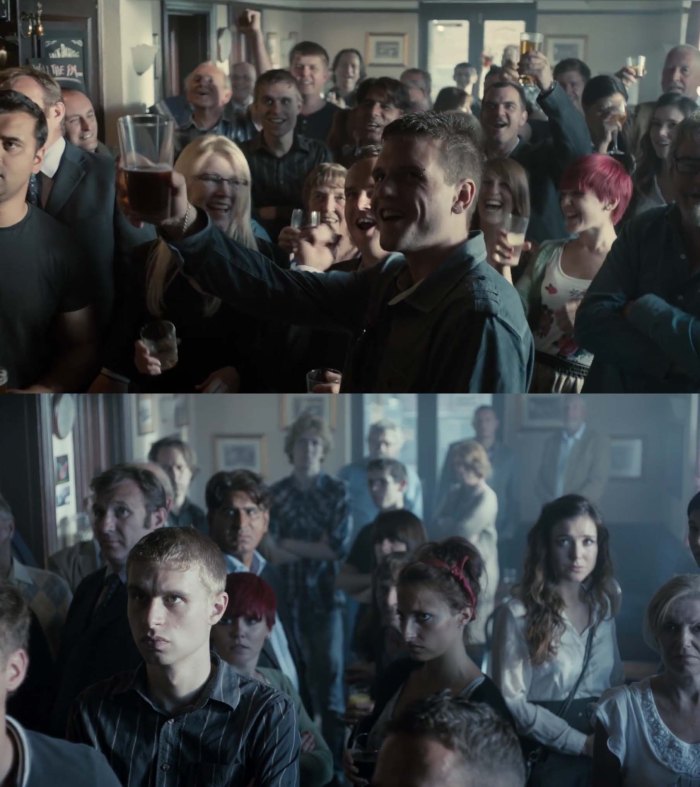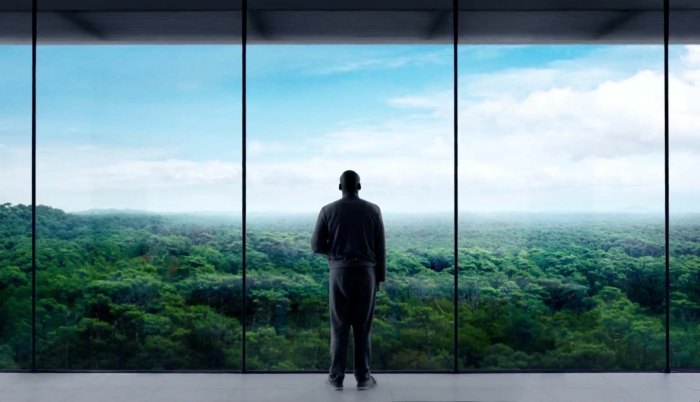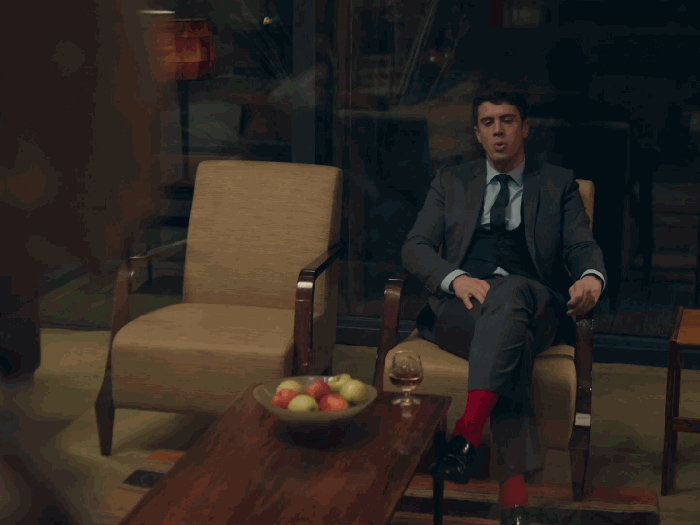Now we can get into the really juicy stuff. What did it all mean? Well, here’s my interpretation of each episode. And final warning, this page is full of spoilers.
The National Anthem

So. You’ve seen it. And now you’ll never un-see it. See what I mean about the ballsiest pilot ever? I’d love to see Charlie Brooker walk into a room with a bunch of Channel 4 executives pitching the opening episode to a show as featuring the PM fucking a pig. It’s audacious, it’s sick, and it’s over the top – and it has to be.
What I love about The National Anthem is how seriously it takes itself. With an absurd, darkly comic premise, the episode pans out in a realistic fashion. Once the shock of the kidnapper’s request wears off, you find yourself thinking: well, wait a minute, what would happen? It’s an ingenious piece of storytelling that develops so subtly that we often forget how unbelievable the idea really is.
But what’s it really about? Well, to me, there are lots of ideas buzzing around in this one. First, we have a hallmark of Black Mirror: Technology may lead to the separation and objectification of individuals. Those we see on screen aren’t the same as those we see in real life. Every encounter that most of us have with the PM is in video form. We don’t see our politicians as real people. I’m guilty of this, wishing terrible things upon celebrities I dislike, as well as upon the likes of David Cameron and Theresa May.
Still, would I wish something so cruel upon them? Would I demand that they shag a pig to save the life of another? (It’s here I make the hilarious connection that many Black Mirror fans love – that ex-PM David Cameron allegedly stuck “part of his anatomy” in a pig’s mouth.)

The point is that the public, as soon as they see the Princess harmed, overwhelmingly opine that Callow should go through with it.
We also see Callow’s wife sifting through something much darker than Black Mirror itself: a YouTube comments section. There, we find vile, witty remarks that egg Callow on. And admit it, reading them, you felt the urge to giggle a little. You can admit it. We’re all terrible people. But if you read those remarks about yourself or a loved one, I’m sure your reaction would have been different.
And even though the episode is a bit choppy, bouncing around various members of the public, I think it’s essential to see the full scope of Callow’s dilemma. Two main public areas are featured: a pub and a hospital. It’s no coincidence that these were chosen. The doctors and nurses – people we believe to be rational and compassionate – engage in the same blind encouragement as everyone else. They can’t wait to see their leader humiliated. The patrons in the pub – perhaps the sort you’d fully expect to want to see such vulgarity – react in the same way as everyone else once the act starts…

Image credit: Black Mirror, Channel 4
Everyone wants to see it happen… until it happens. Seeing the horror on their faces is one of the most affecting moments of TV I’ve ever experienced. Watching them is like watching us – it is the mirror that the title of the show promises. Because in the end, Callow was bullied into it by the public. His staff even warned him that should he not go through with it, he’ll be finished. But when it actually happens, nobody wants to see it. And a real sting comes later when it is revealed that Susanne was released thirty minutes before the broadcast – the public pushed Callow into something that was, ultimately, pointless.
It’s moral is this caution of trial by social media. The government fails to contain the kidnapping because of it. And once the people have their hands on it, they can make anyone do anything. We demand meaningless public apologies from celebrities just to knock them down a peg. We get people fired. We shame people. All in the name of outrage. If we’re not careful, one day we’ll force someone to commit something so disgusting that we’ll regret it as soon as it happens.
Fifteen Million Merits

So, why do they pedal every day? To power the world and earn points. They spend points on food to survive. They survive to pedal some more. They pedal to survive. And on it goes. Why? Well, the real question is: Why do you get up and do your job every day?
This chilling representation of our routine life is one of the most depressing explorations in Black Mirror. Alright, you might be a teacher or a doctor. You might be a creative. But a great many people out there spend their days working jobs that are totally pointless. Why? Because they need the money. And they need the money to survive. And they survive to work… We exist to exist. Bleak, isn’t it?
Not only that but we buy meaningless shit hoping that it’ll make us happy. Fifteen Million Merits hilariously demonstrates this by making every available non-functional purchase something that’s literally not real. And what’s worse is that many of us feel that fame and fortune will rescue us from our torturous existence. Black Mirror has something to say about that, too.
I despise reality TV almost as much as I hate Christmas music, so seeing the likes of X-Factor torn to pieces as the vile construct it is brought me some dark joy. Abi (Jessica Brown Findlay) is selected for an audition because she’s beautiful, while the not so attractive scouser is left waiting for weeks on end. Even Bing is only chosen because he’s ethnic. It’s a bit in-your-face, but it shows that they care much more about what their contestants look like than what talent they harbour.
I know a few of you are thinking about Susan Boyle, but that’s kind of the point. So much news and hearsay surrounding her highlighted her looks. Why? Because a successful contestant being unattractive was an event. If looks didn’t matter at all, nobody would have made a big deal about it. Yet, Google “x factor ugly singer” and what’s the first result? She’s just another story, another ploy to score high ratings – all based on her looks.
Then we have those who actually win Hot Shot. Here the episode not-so-subtly implies that success comes at the cost of literally whoring yourself to the industry. Through a combination of audience pressure, producer manipulation, and medication, Abi is made to take the job as a porn star. It’s a twist that left me breathless. And that’s not even the worst part. When Bing is made to watch that video of his lost love, I wanted to lash out as much as he did.

Then there’s the montage where Bing saves up his merits. The storytelling and emotional impact of the sequence are as effective as each other. Our only reference to the passage of time is the star on Bing’s hand that slowly fades. That’s another element of this (and indeed, each) episode – though it takes place in some exaggerated world, we are never spoon fed. Many of the story elements are told to us visually, and every little nugget of information is utilised before the finale.
After the montage we see Bing’s emotional rant, and it’s brilliant. I love the stark contrast in his character. Even seconds before that scene, he stares lifelessly at the camera and utters, “I’m an entertainer.” All episode, he was barely capable of maintaining eye contact with a friend or stringing a sentence longer than eight words together. But when he can no longer contain himself, his rage and desperation explode out of him in one of the most powerful moments in the series.
“Fuck you for happening,” he roars, and we feel it. It’s here we can all find some delight in his version of vengeance. He just wants something real in his life, and the only thing that came close was torn away from him. It hurts.
Again, this shines a bold light on the fakery of not only our bullshit digital projections but also on these sorts of reality shows. X-Factor is hit with endless criticism for its editing, uses of voice manipulation technology, and staged spats. Beyond that, artists have criticised the show for sapping the creativity out of music. And I agree – contestants are told what and how to sing instead of providing them with the means to explore their own creative processes. It manufactures the same shit we’ve seen and heard before, then pushes them to the top of the Christmas chart. It redefines what we think of as good music. It becomes unavoidable. It’s fake. We all know it. We all lap it up anyway.
The worldbuilding is also aided by the excellent production design. The visuals are still what come to mind when I think “black mirror.” It’s all reminiscent of a smartphone. Black screens are everywhere, with constant sources of distraction in the form of arcade-style games, apps, and avatars. It’s horrible, and enough to make me long for the days of the old Nokia 3310.

Image credit: Black Mirror, Channel 4
The final body blow of the episode comes with the ambiguous ending. Bing, now a video blogger, stares at the trees surrounding his new room. Is he looking through windows at the serene expanse of forests, or is he just surrounded by upgraded screens displaying a new digital facade? It’s a chilling sight that crushes any hopes for a happy ending.
He has a new purpose, but does that matter? His rituals might be different, but he’s still stuck in a routine. He’s still the same person. Are people who acquire fame just as trapped as the rest of us? Is there any escape? Perhaps Bing will never experience anything real. Eventually, maybe none of us will.
The Entire History of You

Trust Charlie Brooker to end the season with such a punch in the gut. There’s something about Entire History that frightens me more than all of the other episodes. As the show’s most accessible episode, it’s also the one that feels the most real. The grain is a revolutionary piece of technology. But the story is grounded by the choice to hone in on such a contained story.
I love how efficient the worldbuilding is. Despite being such a quiet story, we see the extent to which the grain has changed the face of the Earth. There’s everything from new counterterrorism measures as Liam is asked to replay his recent memories at an airport, to grains in infants used to keep an eye on the babysitter. There’s also the subtle point that Liam is a soon-to-be unemployed lawyer. What need do we have for lawyers when every crime is provable given the level of access we have to people’s memories?
We also see how society has shifted on a personal level. Jonas talks about how he uses his grain as his wank bank. Another character admits to being grainless, which seems like a faux pas in this world. We’ve all made crude jokes about using someone’s Facebook pictures to get off. And I imagine that if one of your friends came out as not having a Facebook account, they’d be similarly chastised.
I mention Facebook because that’s what Entire History taps into. The characters’ library of memories is even called a timeline. There’s a digital paper trail for everything we do online, and Facebook is making it easier to record everything we do offline. As it becomes a permanent repository for everything we do in our lives, Black Mirror desperately tries to bring us back to reality and ask us what we really want.
As much as I love the gripping thematic urgency, I also enjoy the engaging directorial style. The shot selection, especially when we accompany Liam as he falls into a jealousy-driven pit of obsession, is really on point. During Liam’s first argument with Ffion (Jodie Whittaker), there’s a lot of over-the-shoulder shot-reverse-shot which aligns us with both characters and lets us choose who to side with. Then there’s how “you’re a bitch” is replayed over the real Liam, highlighting how such permanent memories can dangerously overwrite our perception of people:

Credit: Black Mirror, Channel 4
Their second argument is more intimately filmed, with plenty of close-ups and no shots from Ffion’s perspective. We have to latch onto Liam. These are all things we’re not consciously aware of, but help guide us through the story. Think about it – even when we know Liam’s actions are going to destroy his marriage, we still want him to succeed. The episode relies on us rooting for him so that the conclusion is all the more impactful. Only then can we reflect and see that his own flaws led to his downfall.
As well as the shots there are several impactful cuts in Entire History. One is the moment Liam blacks out. Suddenly we’re in a field, and it’s up to Liam to look back in horror at his crimes. Another is during the episode’s concluding scene, just as Liam realises the destructive impact of his actions:

And finally, there’s perhaps little in Black Mirror as harrowing as the juxtaposition seen when Liam and his wife are having sex. Passionate lovemaking is interspliced with the two having functional sex. The music choice here is also unsettling. The passionate sex is overlayed with unnerving piano; during the bland sex the music is subdued and played in reverse, literally rewound as the couple re-do their hotter sex life. It’s chilling.
Now, I’ve talked about how Liam’s flaws led to the end of their relationship. But that’s not the full story. Ffion chose to downplay her previous relationship. Though, we can understand her reasons given how obsessive Liam can become. It’s also never revealed whether she used a condom when she cheated on Liam.
In the end, it doesn’t matter. All trust, the foundation of any relationship, has dissolved. Their character flaws went unchecked, and that’s the problem. Ffion may have lied, but people lie all the time, and often it’s to protect others. People are also prone to become jealous and obsess. Usually, this might result in a short argument, and that would be the end of it. But it’s the grain that allows these mistakes and traits to flare up and spell the end of things.
Having a library of all of our memories sounds great. My memory is good, but I’ve certainly fantasised about it being perfect. I’d win every argument, never be wrong, assign blame to anyone. And that’s the point. Liam is determined to be right. He wants to assign blame. But is it not better to have some things a little hazy? Ffion probably regrets that night. Either she’ll bottle it up forever or talk about it one day when she’s ready. The grain forces the issue before either of them are ready, and suddenly all trust is destroyed.
This desire for such a device is what I love about Entire History. In the other episodes, nobody wants the situation depicted (regardless of your opinion of our current Prime Minister). But many of us would want a grain. Entire History forces us to take a hard look at what we want from our technology. Too many of us would take it without thinking of its ramifications.
It’s the believability of the grain that is perhaps the saddest thing about the episode. You can’t tell me it wouldn’t immediately catch on. As I said, Facebook is so widespread in the West that it’s almost shameful not to have an account. Just think about that – I’m talking about having an account on a sodding website! It’s only been going for twelve years, yet it’s so deeply ingrained (pun absolutely intended) that it’s redefined what we deem normal in our society. With products like Google Glass, how far are we from having our own grains? Be afraid.
That’s that! I’m on edge waiting for season three – no doubt I’ll review them once they’ve been released and I’ve overcome the emotional shock they’ll hit me with. Be sure to read my reviews for season two and White Christmas!
THERE’S MORE! Follow me @MagoosReviews for updates.
Love Star Wars but hate the prequels? That’s how I feel about The Lord of the Rings and The Hobbit. These trilogies are much more similar than you ever realised!
Need your Game of Thrones fix now that season 6 has ended? Read my breakdown of what went right and wrong with season 5.
Film lover? Want some recommendations? Read my picks for the best films of 2015. Or maybe you’d rather share in my hatred of the worst of 2015.
Check out my weekly film reviews, and find out more about me as a reviewer.